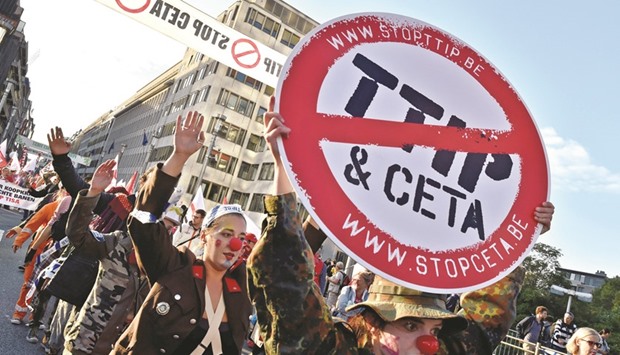Nine thousand people took to the streets of Brussels yesterday to demonstrate against free trade deals that the European Union is pursuing with Canada and the United States.
The protest came three days before EU trade ministers discuss the way forward on the two agreements, which are facing a groundswell of public opposition amid fears that they will benefit large corporations at the expense of consumers and local employees.
The “Stop TTIP & CETA Day” was held in the Brussels neighbourhood that houses the EU institutions.
Organisers estimated that 15,000 people turned out for the event, but the Brussels police said on Twitter that they had counted 9,000 protesters.
Trade unions, non-governmental organisations, farmers and politicians were among those taking part in the event, which was to feature a short march, a flash mob and a night of concerts and speeches, according to the Belga news agency.
The loud march through the European Quarter featured banners reading “People and planet first” and “Power to the people not to multinationals”.
The Comprehensive Economic and Trade Agreement (CETA) deal with Canada has already been negotiated and is supposed to be signed during a visit by Canadian Prime Minister Justin Trudeau on October 27.
It would eliminate 98% of tariffs, allowing the free flow of goods between Canada and EU member states.
The European Commission, the EU’s executive, believes that the CETA is “the best and most progressive trade agreement” ever concluded by the bloc, spokesman Daniel Rosario said yesterday.
But the CETA has been swept up in the mounting opposition that is facing the larger Transatlantic Trade and Investment Partnership (TTIP) agreement being negotiated with the US.
The latter would create the world’s largest free trade area, covering around 800mn people.
Austria’s ruling Social Democrats called yesterday for several parts of the CETA to be changed.
In Germany, tens of thousands of protesters marched on Saturday against both the CETA and the TTIP.
“The commission is fully aware of the lively debate taking place across member states about trade policy,” Rosario said, adding that it expects to hold “frank talks” about the two deals when the EU trade ministers meet in Bratislava on Friday.
Slovak State Secretary Ivan Korcok, whose country currently holds the EU’s presidency, told journalists in Brussels that he expects ministers to discuss the issue “very, very intensively”, but also that he thinks the European Union “would be able to move towards signing” the CETA.
The negotiations on the TTIP began more than three years ago, with supporters arguing that it would create economic growth and jobs on both sides of the Atlantic.
But the deal has been facing ever stronger political headwinds.
Top French politicians spoke out against the agreement last month, leading critics to declare it dead.
A new round of TTIP talks has however been scheduled for October 3-7 in New York.
“Even if the negotiations are on the skids, they are still continuing,” Michel Cermak, one of the organisers of the Brussels demonstration, told Belga.
The TTIP also faces headwinds in the US, amid rising anti-trade sentiment that has stalled a vote on a separate Pacific trade deal.
Republican presidential candidate Donald Trump has spoken out against free trade agreements in his campaign.

MASS
